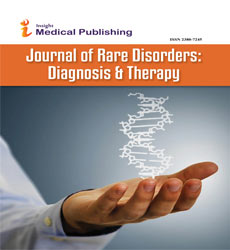Mucopolysaccharidosis: A Complex Metabolic Disorder
Lucas Kempf
Department of Paediatrics and Community Medicine, University of Toronto, Toronto, Canada
DOI10.36648/2380-7245.10.3.165
Lucas Kempf*
Department of Paediatrics and Community Medicine, University of Toronto, Toronto, Canada
- *Corresponding Author:
- Lucas Kempf
Department of Paediatrics and Community Medicine, University of Toronto, Toronto,
Canada,
Email: kempf@gmail.com
Received date: May 29, 2024, Manuscript No. IPRDDT-24-19489; Editor assigned date: May 31, 2024, PreQC No. IPRDDT-24-19489 (PQ); Reviewed date: June 14, 2024, QC No. IPRDDT-24-19489; Revised date: June 21, 2024, Manuscript No. IPRDDT-24-19489 (R); Published date: June 28, 2024, DOI: 10.36648/2380-7245.10.3.165
Citation: Kempf L (2024) Mucopolysaccharidosis: A Complex Metabolic Disorder. J Rare Disord Diagn Ther Vol.10 No.3:165.
Description
Mucopolysaccharidosis (MPS) is a group of inherited metabolic disorders caused by the absence or malfunctioning of lysosomal enzymes needed to break down Glycosaminoglycans (GAGs). These long chains of sugar molecules are used in the building of connective tissues in the body. When these enzymes are deficient or defective, GAGs accumulate in cells, blood, and connective tissues, leading to a variety of health problems. This article aims to provide a comprehensive overview of MPS, including its types, symptoms, diagnosis and treatment options. MPS is classified into several types based on the specific enzyme deficiency and the resulting GAGs that accumulate. The main types of MPS include, the most severe form, characterized by developmental delay, skeletal abnormalities, and organ enlargement. Intermediate severity with features of both Hurler- Scheie syndromes. Milder form with a normal lifespan but significant physical limitations. Symptoms include coarse facial features, hearing loss and joint stiffness. Similar to MPS, but without cognitive impairment. Symptoms include joint stiffness, heart disease and corneal clouding. Rare and characterized by a range of symptoms, including hydrops fetalis skeletal abnormalities and developmental delay.
Clinical manifestations
The symptoms of MPS can vary widely depending on the type and severity of the disorder. However, common clinical features include patients often have distinctive facial features, such as a prominent forehead, flat nose bridge and enlarged tongue. They may also have joint stiffness, short stature, and abnormal bone growth. Cognitive impairment, developmental delays, and behavioral problems are common, particularly in more severe forms like MPS III. Many patients experience hepatosplenomegaly which can lead to abdominal distension and discomfort. Accumulation of GAGs in the airway can cause breathing difficulties, frequent infections, and sleep apnea.
Heart valve abnormalities and cardiomyopathy are common in MPS patients. Corneal clouding, glaucoma, and hearing loss are frequent complications. Diagnosing MPS typically involves a combination of clinical evaluation, biochemical tests and genetic analysis. Physicians look for characteristic signs such as skeletal abnormalities, organ enlargement and developmental delays. Enzyme assays to measure the activity of specific lysosomal enzymes in blood, skin fibroblasts, or other tissues.
Genetic testing
DNA analysis to identify mutations in the genes encoding lysosomal enzymes. This is important for confirming the diagnosis. Currently, there is no cure for MPS, but several treatments can help manage symptoms and improve the quality of life for patients. ERT involves the intravenous administration of synthetic versions of the deficient enzymes. This treatment can help reduce GAG accumulation and alleviate some symptoms. However, it is not effective in treating neurological symptoms due to the blood-brain barrier. HSCT can provide a long-term source of functional enzymes by replacing the patient’s bone marrow with healthy donor cells. This treatment is most effective in young patients with MPS-I and can improve survival and quality of life. SRT aims to reduce the production of GAGs, thereby decreasing their accumulation. This approach is still in experimental stages for MPS. Gene therapy holds promise for treating MPS by delivering functional copies of the deficient genes to the patient’s cells. This approach is still under investigation in clinical trials. Symptomatic treatments such as physical therapy, occupational therapy, respiratory support and surgical interventions can help manage the various complications of MPS. Mucopolysaccharidosis is a complex group of disorders with a wide range of clinical manifestations. While there is no cure, advancements in enzyme replacement therapy, hematopoietic stem cell transplantation, and emerging gene therapies offer hope for improved management and outcomes.
Open Access Journals
- Aquaculture & Veterinary Science
- Chemistry & Chemical Sciences
- Clinical Sciences
- Engineering
- General Science
- Genetics & Molecular Biology
- Health Care & Nursing
- Immunology & Microbiology
- Materials Science
- Mathematics & Physics
- Medical Sciences
- Neurology & Psychiatry
- Oncology & Cancer Science
- Pharmaceutical Sciences
